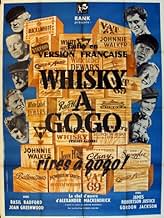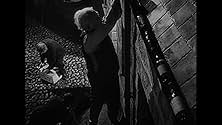AVALIAÇÃO DA IMDb
7,1/10
7,1 mil
SUA AVALIAÇÃO
Quando o suprimento de whisky se esgota numa pequena ilha na Escócia durante a Segunda Guerra Mundial, os habitantes se organizam para pilhar uma embarcação que naufraga com 50 mil caixas da... Ler tudoQuando o suprimento de whisky se esgota numa pequena ilha na Escócia durante a Segunda Guerra Mundial, os habitantes se organizam para pilhar uma embarcação que naufraga com 50 mil caixas da bebida.Quando o suprimento de whisky se esgota numa pequena ilha na Escócia durante a Segunda Guerra Mundial, os habitantes se organizam para pilhar uma embarcação que naufraga com 50 mil caixas da bebida.
- Direção
- Roteiristas
- Artistas
- Indicado para 1 prêmio BAFTA
- 1 vitória e 1 indicação no total
Avaliações em destaque
A lovely bit of nostalgia here, one of the greats of British comedy. The isle of Toddy becomes for a while at least a true paradise when the islanders find themselves rescuing part of the cargo of a wrecked ship carrying precious whisky, despite the efforts of the sassenach jobsworth running the local home guard. A wealth of wonderful moments, a softly-spoken gentleness that has always characterised this kind of movie (and lives on in such modern works as Hear My Song and Waking Ned), and a kind but firm lack of respect for bureaucratic authority soaked throughout the entire film make this a delight and a joy every time.
Delightful post-war British comedy illustrating for the umpteenth time the fighting spirit of the "ordinary Joe" (or in this case Jock) when set against the pomposity of the would-be ruling classes. Capt Waggett (Basil Radford) is the real star here as the middle class representative of stiff upper lippery. Surely Jimmy Perry and David Croft must have drawn on him when they were dreaming up the Capt Mainwaring character for the long-running BBC TV sit-com "Dad's Army". Even one of Waggett's lines ("I was waiting to see when you'd spot that", a comment usually made when Mainwaring had just uttered some piece of logistical nonsense) made an appearance. Unmissable example of British comedy rooted in the style that made Ealing so succesful.
Whisky Galore AKA Tight Little Island is one of the funniest movies I have ever seen. Alexander MacKendrick did a fantastic job in bringing Compton MacKenzie's book Whisky Galore to the big screen. MacKendrick keeps the pace going with plot twists that would cause one to "bust a gut." If you are looking for a truly enjoyable movie to lighten your mood, Whisky Galore is a must.
A little town on a Scottish Isle suffers the most horrifying predicament, of which the outbreak of WWII in hindsight seemed to be an omen: they're out of whiskey! Everyone goes into an almost catatonic state until fortune takes a turn for the better: a ship is wrecked on a reef. The cargo: 50,000 cases of whiskey. But there's one do-gooder, the local militia leader, who just can't allow the cargo to be put to use. That, he says would lead to anarchy. Many well defined characters, good plot.
Out of Ealing Studios, Whisky Galore! is directed by Alexander Mackendrick and adapted to screenplay by Compton Mackenzie (novel also) and Angus MacPhail. It stars Basil Radford, Wylie Watson, Catherine Lacey, Bruce Seton, Joan Greenwood and Gabrielle Blunt. Music is by Ernest Irving and cinematography by Gerald Gibbs.
When a ship with a cargo of 50,000 bottles of whisky is shipwrecked near the Outer Hebrides island of Todday, the villagers, out of their whisky rations, set about pillaging as much of it as they can before the authorities take control.
Of the many thematic successes that Ealing Studios worked from, one of the highlights was the theme of a community rallying together to thwart an oppressive force. Reference Passport to Pimlico, The Titfield Thunderbolt and Whisky Galore! The latter of which was worked from a true story. In 1941 the cargo ship SS Politician was shipwrecked near the island of Eriskay in the Outer Hebrides, its main cargo of whisky and Jamaican shilling notes was mostly salvaged by the islanders. Ealing's take on the general story is condensed down to being an ode to anti authoritarianism and drink! With joyous results.
Filmed on location close to Eriskay at Barra, the production had to overcome creative differences and awful weather to become the wonderful finished product. In fact the production went well over budget, a big no no on Ealing terms. Creative difference came between co-producer Monja Danischewsky and rookie director Mackendrick, where the former was firmly on the side of the islanders' pillage tactics, and the latter siding with Home Guard Captain Waggett's (Radford) feeble attempt to keep order. Danischewsky won out, where in spite of a code enforced epilogue, film plays out rooting for the islanders, gaining much humour from Waggett being an Englishman who is completely at odds with what he sees as the Scottish islanders anarchic behaviour.
The Water Of Life.
The community of Todday is bound by its love of whisky, makers extract quality mirth by presenting the sorrow brought about by the whisky running dry, only to then have the islanders lives perked up by the stricken fate of the ship carrying "the water of life". How the people react to the news of the ships cargo, how they set about purloining said cargo and how they hide said cargo from the authorities, is what brings the joy to Whisky Galore! Rarely has a cinematic treatment to larceny been so sweet and deftly handled as it is here. There's even an aside to class distinction, a nod to religious conformity and two lightly (unobtrusive) portrayed romances within the story. And with a cast bang on form, notably Radford, Watson and the gorgeous Greenwood, it rounds out as one of Ealing's most smartest and joyous comedies.
It gladdened the hearts of many back on release as Britain continued to rebuild after the war, that it still entertains new observers even today is testament to Whisky Galore's lasting appeal. 9.5/10
When a ship with a cargo of 50,000 bottles of whisky is shipwrecked near the Outer Hebrides island of Todday, the villagers, out of their whisky rations, set about pillaging as much of it as they can before the authorities take control.
Of the many thematic successes that Ealing Studios worked from, one of the highlights was the theme of a community rallying together to thwart an oppressive force. Reference Passport to Pimlico, The Titfield Thunderbolt and Whisky Galore! The latter of which was worked from a true story. In 1941 the cargo ship SS Politician was shipwrecked near the island of Eriskay in the Outer Hebrides, its main cargo of whisky and Jamaican shilling notes was mostly salvaged by the islanders. Ealing's take on the general story is condensed down to being an ode to anti authoritarianism and drink! With joyous results.
Filmed on location close to Eriskay at Barra, the production had to overcome creative differences and awful weather to become the wonderful finished product. In fact the production went well over budget, a big no no on Ealing terms. Creative difference came between co-producer Monja Danischewsky and rookie director Mackendrick, where the former was firmly on the side of the islanders' pillage tactics, and the latter siding with Home Guard Captain Waggett's (Radford) feeble attempt to keep order. Danischewsky won out, where in spite of a code enforced epilogue, film plays out rooting for the islanders, gaining much humour from Waggett being an Englishman who is completely at odds with what he sees as the Scottish islanders anarchic behaviour.
The Water Of Life.
The community of Todday is bound by its love of whisky, makers extract quality mirth by presenting the sorrow brought about by the whisky running dry, only to then have the islanders lives perked up by the stricken fate of the ship carrying "the water of life". How the people react to the news of the ships cargo, how they set about purloining said cargo and how they hide said cargo from the authorities, is what brings the joy to Whisky Galore! Rarely has a cinematic treatment to larceny been so sweet and deftly handled as it is here. There's even an aside to class distinction, a nod to religious conformity and two lightly (unobtrusive) portrayed romances within the story. And with a cast bang on form, notably Radford, Watson and the gorgeous Greenwood, it rounds out as one of Ealing's most smartest and joyous comedies.
It gladdened the hearts of many back on release as Britain continued to rebuild after the war, that it still entertains new observers even today is testament to Whisky Galore's lasting appeal. 9.5/10
Você sabia?
- CuriosidadesAmerican censors of the day insisted on a coda being inserted at the end of the film stating that the stolen whisky brought nothing but unhappiness to the islanders, although in real life quite the opposite was true.
- Erros de gravaçãoHad there really been whisky (or anything except air) in those wooden crates piled as high as a person on the rowboats the villagers use to loot the cargo ship, those boats would have capsized or sunk by the sheer weight of the crates.
- Cenas durante ou pós-créditosOpening credits prologue: By a strange coincidence the S.S. Cabinet Minister was wrecked off the Island of Todday [in the movie] two years after the S.S. Politician, with a similar cargo, was wrecked [in real life] off the Island of Eriskay. But the coincidence stops there, for our story and the characters in it are pure fiction.
- ConexõesFeatured in Tuesday's Documentary: The Ealing Comedies (1970)
- Trilhas sonorasBrochan Lom, Tana Lom
(uncredited)
Traditional
Sung when the whisky is first being shared out
Principais escolhas
Faça login para avaliar e ver a lista de recomendações personalizadas
- How long is Whisky Galore!?Fornecido pela Alexa
Detalhes
Bilheteria
- Faturamento bruto mundial
- US$ 11.444
- Tempo de duração
- 1 h 22 min(82 min)
- Cor
- Proporção
- 1.37 : 1
Contribua para esta página
Sugerir uma alteração ou adicionar conteúdo ausente





































